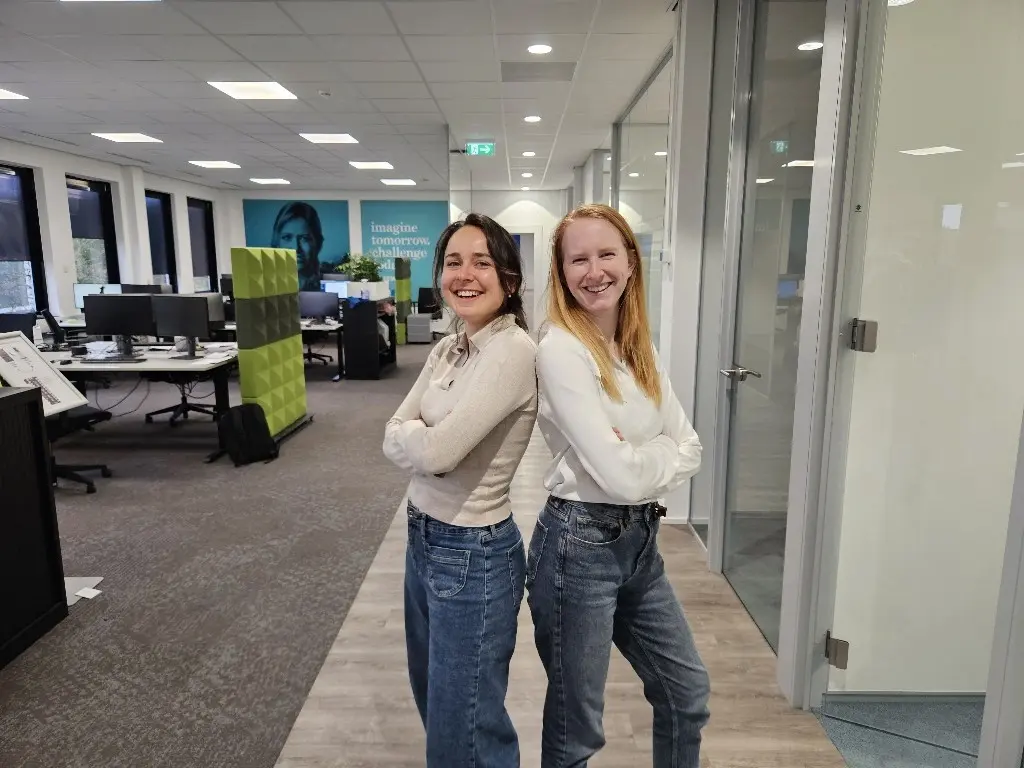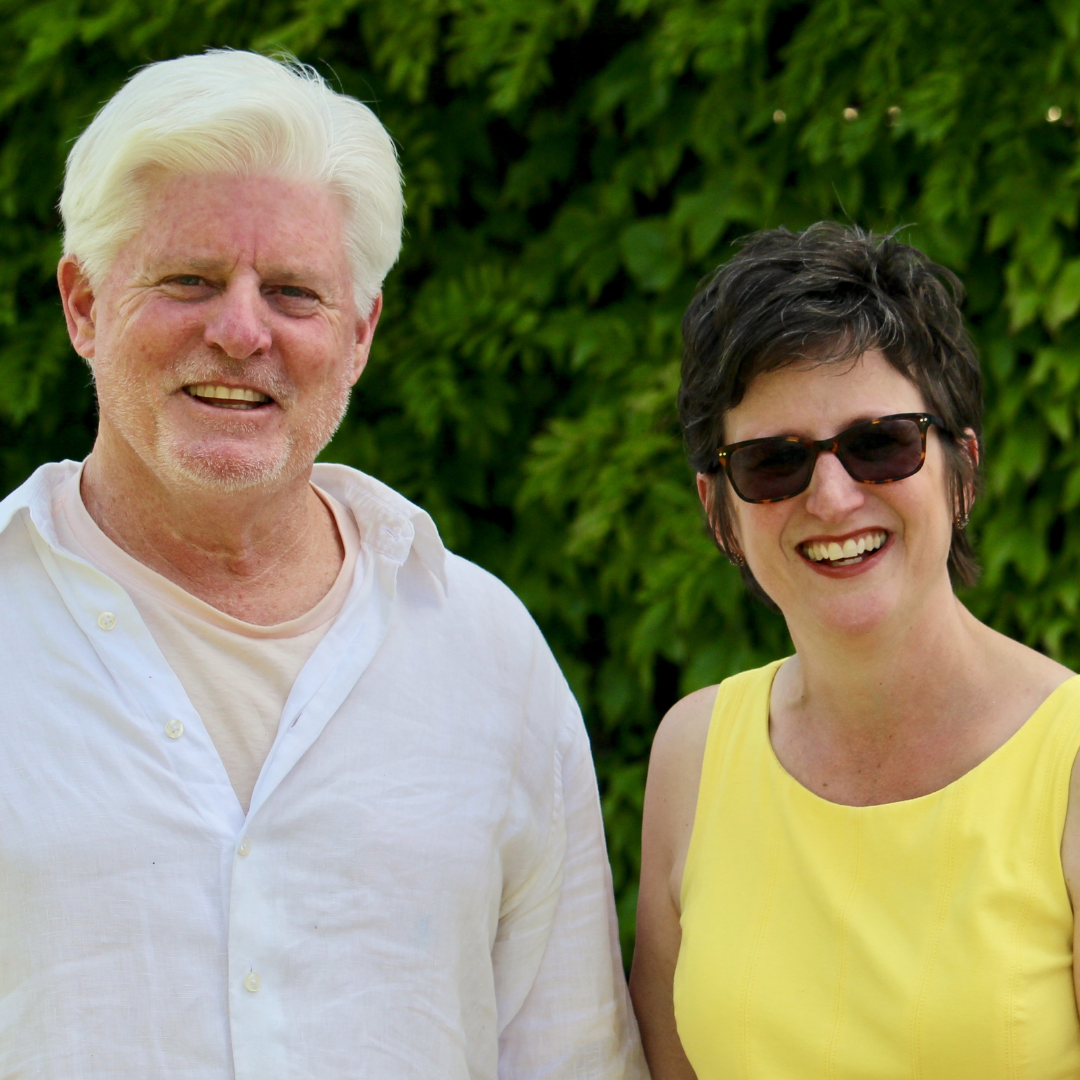


Meet Astrid Pouwels and Eliene Rutten, two women advancing medical device development in the region. Engineers by training, they now hold leadership roles as project managers at Demcon. They are remarkable women carving their early career paths in the tech industry.
These women represent a new generation of females in tech. Although still faced with small numbers of females at their respective universities, they feel completely at home in the tech environment and feel they have every opportunity open to them. In the ever-evolving landscape of technology, these two women believe in the value of female intuition, empathy and collaborative spirit in driving innovation and progress.

Eliene Rutten, left, and Astrid Pouwels, Project Managers at Demcon.
While Astrid Pouwels and Eliene Rutten are now on similar career paths, they started from different places.
Pouwels pursued an Industrial Design Engineering bachelor’s degree from the University of Twente but moved departments for her master’s degree in mechanical engineering. She worked for a U.S.-based sustainable coffee maker startup before moving to Demcon for a mechanical engineering role.
In contrast, Rutten completed her bachelor’s and master’s in biomedical engineering at the Eindhoven University of Technology. She also went to work for a startup after university, helping develop a continuous biomolecular sensor for the smart food industry.
Gender balance is dependent on the field of study
At both Dutch university tech programs, they faced challenges of being a woman among many men, although it depended heavily on the class and the major.
Pouwels found mechanical engineering to be quite male-dominated and initially chose industrial engineering instead.
“I chose industrial design engineering because there were women there, not necessarily because I liked it more. It definitely had an influence, but I ended up in the same place,” says Pouwels.
“I had classes where I was the only female,” continues Pouwels. “We had a really nice woman teaching in mechanical engineering. She helped me transfer studies. It was nice to have someone teaching that I could look up to.”
Rutten’s experience was markedly different, and there was a more balanced ratio of women in her field of study, as well as quite a few female professors to learn from.
“In biomedical engineering, there were a lot more females,” she says. “The ratio was almost half. The courses were just as tough and very technical, but it's applied to the human body. I think women want to do something for the better, like in healthcare.”
Moving from engineering to leadership
After working for startups, both women were hired by Demcon. The company works with clients to engineer, develop and manufacture innovative, high-end systems and products. While the company has a broad reach in many markets, Pouwels and Rutten work in medical technology/product development within Demcon.
In their current roles as project managers, they have moved away from engineering but are still involved in technical decisions. They are responsible for all the technical decisions that are made in the project –decisions such as which path to take and which people should be involved in the decision process.
“We're not the people who know all the technical details, but we know who needs to be involved,” Pouwels says.
“But you need to have a technical background to be able to ask the right questions, talk to the engineers and to be able to sense if something needs attention,” Rutten adds.
Both women have found their roles to be dynamic, with different projects running all the time. They work with scale-ups and startups across different countries and different fields within healthcare. With startups, the women usually support a small team, and they enjoy working with them as part of the team.
Startups get funding and then need a commercial product, moving beyond an idea to the very real, very competitive marketplace. Sometimes the startups do not have the right people on board and then come to Demcon.
“We can design their product from scratch,” Rutten says.
“We work very closely together and are like colleagues of the startup. They have a lot of knowledge and we need to leverage both sides,” continues Rutten.
Promoting diversity and inclusion
At Demcon, where women make up about 20% of the workforce, Pouwels and Rutten see firsthand the impact of diversity on company culture and innovation. There’s a female in almost all teams, which already makes a difference, according to the two women.
For them, Demcon provides an open, welcoming and diverse environment, where individuals feel valued and supported regardless of gender.
Pouwels shared her perspective on diversity: "It's not only about women and men. If your company is very diverse, it doesn't matter if it's all men and you're the only woman because it's diverse."
She goes further, saying being a woman can be a benefit. “I think it’s easier to bond here as a woman when you first start than as a man,” she says. Women provide each other with a tight-knit community within Demcon, and they rally together to support each other, Pouwels and Rutten agree.
Women in visible roles
Just as the female professors left an impression, Pouwels and Rutten were quick to mention the impact of having a female boss. Lisa op ‘t Hof is Demon’s Managing Director of Life Sciences and Health in Eindhoven. She is young and vibrant and that has a ripple effect.
“She has great energy and is a true role model for so many women in the company. Just seeing her operate as a manager is important,” says Rutten.
Pouwels also believes in the power of women in visible, leadership positions: “I think when there’s at least one woman in a company, it speeds up [diversity] because other women want to work there as well. It makes a difference.”
Role models and mentors
Women in leadership is important, but they are just as critical to mentorship. Pouwels and Rutten attribute much of their success to the guidance and support of mentors, particularly female role models.
Rutten’s mother served as her primary inspiration, demonstrating women can excel in anything they choose.
“I was raised by my mother,” says Rutten. “She was always my role model because she did everything. Taking care of me and having a full-time job. She raised me with the idea that women can do everything and you need to be independent.”
In the workplace, they emphasize that mentorship goes beyond technical guidance. Rather, it provides invaluable support and encouragement. They believe a good mentor can see the full “you,” what will fit you and where you could develop.
“It’s good to have a mentor in addition to your boss, even if your boss is really nice,” says Pouwels.
Finding your individual style
Women bring a lot to the world of tech, including a different intuition, empathy and collaborative spirit that can drive innovation and progress.
“It's not like women should be like men. It's not like we should be like male leaders. We can do it in a very authentic way that fits us.
“For a woman, that might be very different,” Rutten believes.
Pouwels feels the same way. “It's not my method to be very overpowering in a meeting. That’s not my style,” she says. “Finding your own way of leadership is important.”
This is especially important as a manager. Pouwels and Rutten believe in the importance of empathy and asking questions as a project manager. They strongly believe people feel more comfortable opening up to a woman.
“Females are a little more empathic and caring,” Rutten explains. “The fact that you're a woman can bring a lot of advantages. This is the great thing about being a female project manager. You ask questions and people are so open to you.”
“They don't feel intimidated,” Pouwels chimes in.
“I think the most important thing is that I do not feel that I have less chances here than males. I'm sure about that. It's really about who you are,” Rutten says about the opportunities within Demcon.
Empowering the Next Generation
Pouwels and Rutten see the number of females in tech rapidly growing and they would encourage girls and young women to pursue careers in STEM fields. They stressed the importance of self-belief, confidence and resilience in navigating challenges of a male-dominated industry, as well as embracing the benefits.
They advise girls to go with their gut, even if there are initial doubts, and choose the technical field if that’s what they want.
Rutten offers her advice to aspiring women in tech: "If you want to, you can do it. Just believe in yourself and be confident. Women are much more humble, so speak up a little bit more about what you want.”
This confidence also extends after university – to the job hunt and workplace – so women can persevere to find employers who fit their values.
Today’s younger generation wants more than just a job. Young people want a job they enjoy and at a company that promotes the ideals they believe in. This prioritizes things like friendly colleagues, female co-workers, a welcoming culture and a diverse workforce and mindset.
To attract women and other talented people, top executives have to ask themselves some hard questions and reinvent their workplace environment and culture if they aren’t there yet.